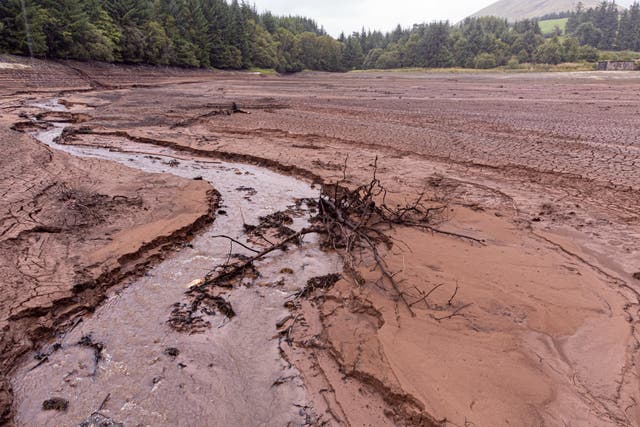Drought declared across whole of Wales despite recent rainfall
It is the first country-wide drought for 16 years.

A drought has been officially declared across the whole of Wales despite recent rainfall, Natural Resources Wales (NRW) has announced.
It is the first country-wide drought for 16 years, and comes after the nation only experienced 56% of its average rainfall between March and August.
The six-month period has been the third driest since records began in 1865.
Despite recent heavy rain and flooding in some parts of the country, NRW said it would take time to restore ground, river and reservoir water levels.
The decision to take most of the country from ‘prolonged dry weather’ status to drought came after a meeting on Thursday between the Wales Drought Liaison Group, which includes NRW, water companies, Public Health Wales (PHW), and a number of other bodies.

“Rainfall experienced across the country over recent weeks has not been anywhere near enough to replenish rivers, groundwater or reservoirs to normal levels.
“We will need to see sustained or above-average rainfall over the coming weeks and months to see any tangible difference. If we don’t see that rainfall, we can expect many areas to remain in drought.
“While essential water supplies remain safe, the public and businesses right across Wales areas are being urged to use water wisely and manage this precious resource at this time.”
The government agency said the situation showed a “pressing need” to prepare and adapt to the environmental impacts of climate change.
Ms Hall added: “We do expect these events to occur more frequently due to climate change and we are building that knowledge into our preparations.”
She said the long-term effects of the drought on the environment may not be known for some time.
The agency said water levels in rivers including the Wye, Usk, Dee and Upper Severn remained very low and there is concern about fish, many of which have been found in distress or dying, and other wildlife.
Peatlands, wetlands and mature forests appear to be coping well, it added.
Welsh Water said there would be no impact on supply of water to households or businesses.

And urged against using bottled water to make up infant formula as it may not be sterile and contain minerals that are not healthy for young children.
Examples of steps people are advised to take to reduce their water consumption and avoid being wasteful include only using the washing machine or dishwasher for a full load, and taking a shower instead of a bath.
Wales uses more water per head than in the rest of the UK, and Welsh Water said it was looking at how to encourage the public to use less.





